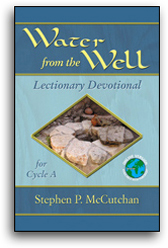Easter 4
Devotional
Water From the Well
Lectionary Devotional For Cycle A
Object:
All who believed were together and had all things in common; they would sell their possessions and goods and distribute the proceeds to all, as any had need.
-- Acts 2:44-45
There has been a lot of energy spent on trying to understand this statement about the life of the early church. Some try to explain it in terms of the early church's belief that Christ would come again soon and that their whole lives needed to be directed in preparation for receiving him. When Christ did not return, they explain, the church soon realized that such an ethic was hopelessly impractical. Others suggest that it is the ideal toward which the church should continue to try to move. Certainly it is a story intended to place material goods in their proper perspective. "You cannot serve God and wealth" (Matthew 6:24). It is instructive that far more commentary has been focused on this verse than the other verses describing the early church's activity. "They devoted themselves to the apostles' teaching and fellowship, to the breaking of bread and prayers."
The economic decisions were a direct outgrowth of their emphasis on fellowship, scripture, and prayer. In that intense devotion to loving God and neighbor, as experienced in the fellowship of these new believers, all their economic possessions became merely materials to be used for a greater good. The question to be addressed is whether a church could be so devoted to each other and to God and not be willing to share whatever material blessings they had with each other as each had need. For these believers, the church was family and that is just how you act in a family. The testimony to the power of that loving community is seen in the reaction of outsiders: "And day by day the Lord added to their number those who were being saved."
-- Acts 2:44-45
There has been a lot of energy spent on trying to understand this statement about the life of the early church. Some try to explain it in terms of the early church's belief that Christ would come again soon and that their whole lives needed to be directed in preparation for receiving him. When Christ did not return, they explain, the church soon realized that such an ethic was hopelessly impractical. Others suggest that it is the ideal toward which the church should continue to try to move. Certainly it is a story intended to place material goods in their proper perspective. "You cannot serve God and wealth" (Matthew 6:24). It is instructive that far more commentary has been focused on this verse than the other verses describing the early church's activity. "They devoted themselves to the apostles' teaching and fellowship, to the breaking of bread and prayers."
The economic decisions were a direct outgrowth of their emphasis on fellowship, scripture, and prayer. In that intense devotion to loving God and neighbor, as experienced in the fellowship of these new believers, all their economic possessions became merely materials to be used for a greater good. The question to be addressed is whether a church could be so devoted to each other and to God and not be willing to share whatever material blessings they had with each other as each had need. For these believers, the church was family and that is just how you act in a family. The testimony to the power of that loving community is seen in the reaction of outsiders: "And day by day the Lord added to their number those who were being saved."


